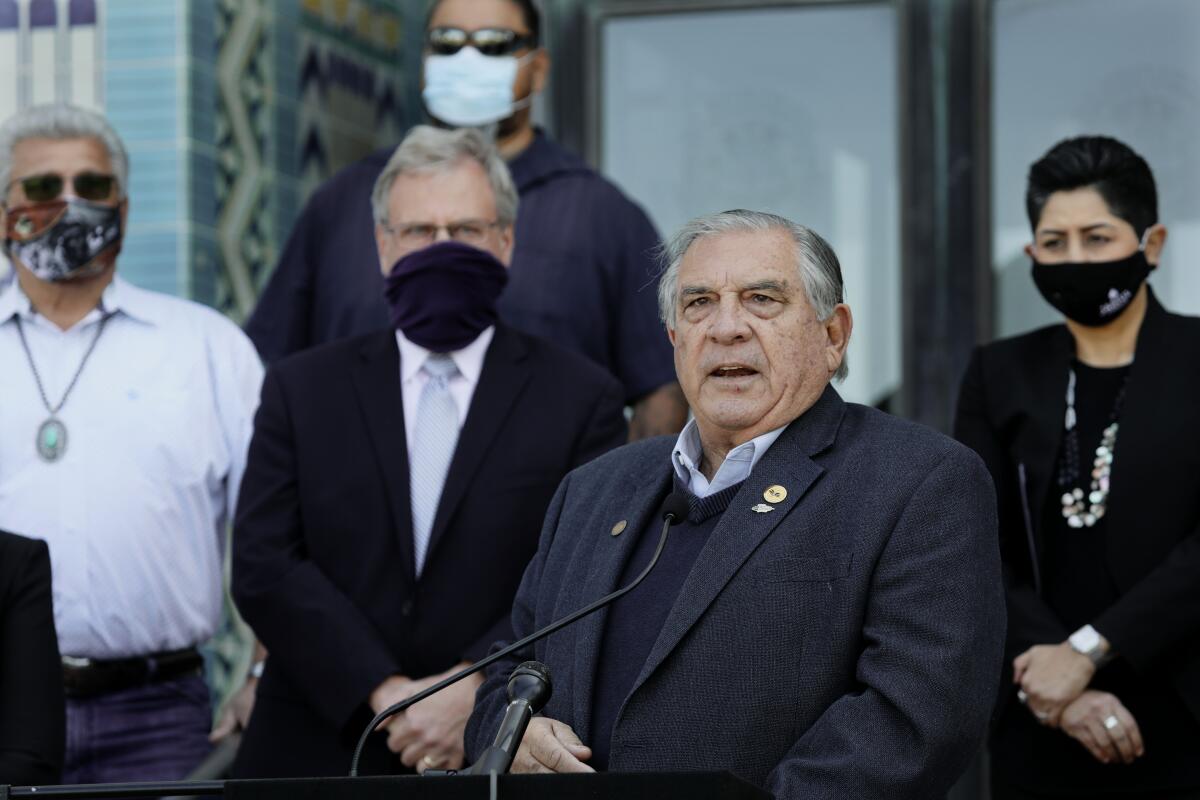San Diego supervisors delay vote on lifting barriers to tribes expanding their reservations

SAN DIEGO — In a move that disappointed tribal leaders, the San Diego County Board of Supervisors this week delayed voting on a proposal to repeal a decades-old policy prohibiting the region’s 18 tribes from expanding their reservations.
The proposal was announced last week by Supervisor Jim Desmond and local tribal leaders.
Supervisor Nora Vargas, who cosponsored the action, asked the board to continue the item until May 5 to give community members more time to digest it.
If the policy is repealed, it would also scale back the strict requirements for tribes to obtain liquor licenses, and would establish a tribal liaison to strengthen the relationship between the county and each tribal government.
“I just want to give my constituents a little bit of time to have a conversation,” Vargas said. “I fully support the intent of this letter. I just want to make sure that I address some of these concerns, and I’m happy to come back on May 5 and move forward.”
Several tribal leaders called in to the meeting to speak about what the change would mean for their communities, including Chairman Bo Mazzetti from the Rincon Band of Luiseño Indians and Chairwoman Erica Pinto from the Jamul Indian Village.
Pinto said repealing what she referred to as an outdated, discriminatory policy would promote inclusivity and collaboration between the tribes and the county.
“This new direction is something that’s beneficial to the entire county of San Diego,” Pinto said. “Just a removal of a blanket policy, I thought today, would be a no-brainer for all of us, and I strongly urge and encourage the county to please move forward with this today.”
Joely Proudfit from the Luiseño/Payomkawichum community spoke in support of repealing the policy because of the contributions the tribes have made to local education. She is a professor at Cal State San Marcos who serves as the chair of American Indian studies and director of the California Indian Culture and Sovereignty Center.
“Tribal growth is good for education, tribal growth is good for our campuses,” she said. “The tribal nations of this county have been vital partners in supporting the education of our county’s residents and our students.”
Since November 2000, the county has had a blanket policy to block tribal fee-to-trust applications, making it harder for tribes to add land they purchase to their reservations.
The Bureau of Indian Affairs fee-to-trust process supports tribes’ rights to self-determination, according to the U.S. Department of the Interior website. Many federal programs and services to support tribal members are available only on reservations or trust lands.
Trust acquisitions allow tribes to develop the land they purchase as housing for tribal members, to access and use natural resources, and to build energy developments.
After the board meeting, Mazzetti expressed his disappointment with the delay.
“Today is a really bad, unbelievable day for the tribes throughout San Diego County,” Mazzetti said. “For the board to push back on the vote demonstrates their continued support for this racist and discriminatory policy.”
With the county’s opposition to these applications, the process of fee-to-trust applications can be lengthy and expensive for tribes.
It can take up to 12 years to add a parcel of land to Rincon’s reservation, Mazzetti said, and Sycuan Band of Kumeyaay Nation Chairman Cody Martinez said his tribe paid more than $20 million to add the Sloan Canyon parcel to its reservation.
While the county receives property taxes from lands that the tribes purchase, in some cases there is no legal access point for county officials to maintain the land because it’s surrounded by reservation land.
Mazzetti said tribes manage water, trash and maintenance on the nonreservation parcels they own, and pay for fire departments and security services that benefit the county as a whole. Rincon alone spends $4.5 million a year on its fire department and nearly $600,000 for two sheriff’s deputies, he added.
“These deputies can go anyplace in the county and respond,” Mazzetti said. “So they need to take into consideration all of these benefits that the tribes are providing to the local surrounding communities of taxpayers when we look at trying to purchase a parcel to add to a reservation.”
Desmond was disappointed by the 4-1 decision to push back the vote, calling it “a slap in the face” to local Indigenous community members.
“I think we should move forward on this today. This has waited too long,” Desmond said. “It doesn’t change any process — we can still oppose projects that we don’t like or we don’t want or we don’t think are worthy — it just takes away the blanket, upfront ‘No.’”
Desmond added during the meeting that he received an email calling the proposal a “cardroom killer,” which he rejected because it still wouldn’t automatically allow tribes to build casinos wherever and whenever they choose.
More to Read
Sign up for Essential California
The most important California stories and recommendations in your inbox every morning.
You may occasionally receive promotional content from the Los Angeles Times.











